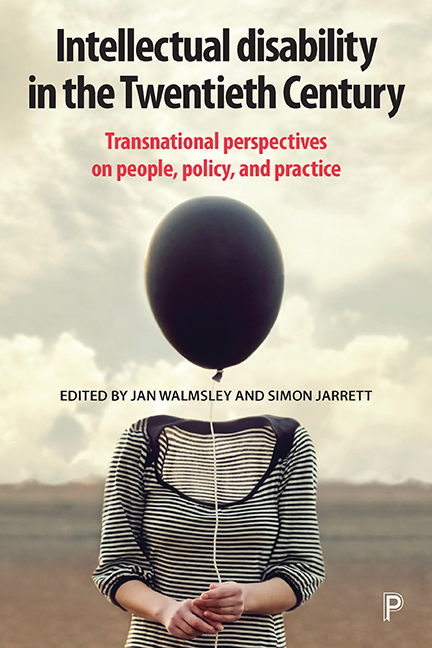 Intellectual Disability in the Twentieth Century
Intellectual Disability in the Twentieth Century Book contents
- Frontmatter
- Contents
- Notes on editors and contributors
- Introduction
- one Paradoxical lives: intellectual disability policy and practice in twentieth-century Australia
- two Tracing the historical and ideological roots of services for people with intellectual disabilities in Austria
- three Time of paradoxes: what the twentieth century was like for people with intellectual disabilities living in Czechoslovakia/Czech Republic
- four Intellectual disability in twentieth-century Ghana
- five A Greek Neverland: the history of the Leros asylums’ inmates with intellectual disability (1958–95)
- six Intellectual disability in Hong Kong: then and now
- seven People with intellectual disabilities in the European semi-periphery: the case of Hungary
- eight People with intellectual disabilities in Iceland in the twentieth century: sterilisation, social role valorisation and ‘normal life’
- nine Institutionalisation in twentieth-century New Zealand
- ten ‘My life in the institution’ and ‘My life in the community’: policies and practice in Taiwan
- eleven Intellectual disability policy and practice in twentieth-century United Kingdom
- twelve From social menace to unfulfilled promise: the evolution of policy and practice towards people with intellectual disabilities in the United States
- Index
four - Intellectual disability in twentieth-century Ghana
Published online by Cambridge University Press: 27 April 2022
- Frontmatter
- Contents
- Notes on editors and contributors
- Introduction
- one Paradoxical lives: intellectual disability policy and practice in twentieth-century Australia
- two Tracing the historical and ideological roots of services for people with intellectual disabilities in Austria
- three Time of paradoxes: what the twentieth century was like for people with intellectual disabilities living in Czechoslovakia/Czech Republic
- four Intellectual disability in twentieth-century Ghana
- five A Greek Neverland: the history of the Leros asylums’ inmates with intellectual disability (1958–95)
- six Intellectual disability in Hong Kong: then and now
- seven People with intellectual disabilities in the European semi-periphery: the case of Hungary
- eight People with intellectual disabilities in Iceland in the twentieth century: sterilisation, social role valorisation and ‘normal life’
- nine Institutionalisation in twentieth-century New Zealand
- ten ‘My life in the institution’ and ‘My life in the community’: policies and practice in Taiwan
- eleven Intellectual disability policy and practice in twentieth-century United Kingdom
- twelve From social menace to unfulfilled promise: the evolution of policy and practice towards people with intellectual disabilities in the United States
- Index
Summary
Ghana, a country in West Africa with a current population of just under 30 million, was a British colony until 1957 (previously called the Gold Coast), when it became the first colony in sub-Saharan Africa to regain its independence.
Prior to independence, Britain, as the colonial power, extracted natural resources – gold, diamonds, timber and cocoa. Britain built railways and transport systems to assist resource extraction. A few Western-style hospitals and schools were built, with the education system geared to training a Ghanaian elite to run the country on Britain's behalf, at least initially. Many schools were modelled on British boarding schools and run by missionaries and educators from Britain and other European countries. However, day-to-day life for the majority of Ghanaians – including those with disabilities – was little touched by the colonisers, being determined rather by local tradition, chiefs and clan elders. In the latter part of the twentieth century, increasing urbanisation and technological development began to drive more significant changes in lifestyle and attitudes, particularly in urban areas.
Recognition of intellectual disability and lack of visible presence of people with intellectual disability in Ghana
Throughout the twentieth century, there seems to have been little visible presence of persons with intellectual disability. This was in part because persons with mild disabilities tended to be relatively well integrated in their village/clan/family group in Ghana, especially in rural areas where subsistence agriculture was (and remains) dominant, and literacy was relatively unimportant. On the other hand, persons with more profound impairments often did not survive infancy.
The development of educational provision during the twentieth century increased the visibility of some children with disabilities. At the time, it was assumed these children were unable to access mainstream education. Some special schools were started, the first being the Blind School in Mampong, founded in 1945 by Basel Missionaries. The first special school for children with intellectual disabilities was Dzorwulu Special School in Accra, founded in 1970. But although intellectual disability was sometimes recognised, there were no systematic records kept. Indeed, there are still few statistics and little research on intellectual disabilities in Ghana, and no reliable figures on how many people there are. Within Ghana there was no standard definition, and a lack of recognised professionals able to monitor and assess people.
- Type
- Chapter
- Information
- Intellectual Disability in the Twentieth CenturyTransnational Perspectives on People, Policy, and Practice, pp. 67 - 78Publisher: Bristol University PressPrint publication year: 2019


